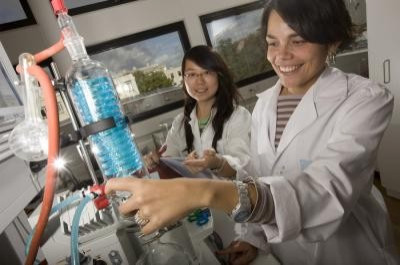Study Reveals Technique For Safer Biofuels

The buzz around biofuels is not new but the ability to measure the toxicity of these fuels much before production levels are standardized, could definitely save the environment. Replacing gasoline and diesel with plant-based biofuels is well accepted, but methods of production that lead to safe biofuels can now be computed.
A new study published in the Journal of Physical Chemistry talks on a mathematical model that ensures climate and environment friendly alternatives to fossil fuel. Corroborated by lead chemist, Solvejg Jorgensen of the University of Copenhagen, Denmark, noted that computer analysis could predict the toxicity levels of biofuels.
The study is based on Jorgensen's calculations that reveal how biofuels when produced by the wrong synthesis path can decompose to compounds, giving rise to either unhealthy smog, carcinogenic particles or toxic formaldehyde. The research dwells on developing safer alternatives to biofuels that is less expensive and quicker to manufacture.
Jorgensen has made public various production methods that could be tested on the computer resulting in cheaper and safer development of biofuels. "There is an almost infinite number of different ways to get to these fuels. We can show the least hazardous avenues to follow and we can do that with a series of calculations that take only days", explains Jorgensen.
It is a well known fact that some compounds are more toxic than others but Jorgensen's findings relate to her calculations which showed that there is a huge difference in toxicity depending on how the molecules were assembled during production.
Jorgensen explained, "In order to find the best production method a chemist might have to test thousands of different types of synthesis. They just can't wait for a method that takes months to predict the degradation mechanisms". "On the other hand, for a chemist who might spend as much as a year trying to get the synthesis right it would be a disaster if their method leads to a toxic result", she added.
In her attempt to improvise on existing theoretical models that link degradation of large molecules in the atmosphere, it was by accident that she stumbled upon this new discovery which could change future techniques in producing green fuels.
"I accidentally based my calculations on the wrong molecule, so I had to start over with the right one. This meant I had two different calculations to compare. These should have been almost identical but they were worlds apart. That's when I knew I was on to something important", says Solvejg Jorgensen.
Close on the heels of this study was another theory that was published earlier which said agave, a plant used to produce tequila, could provide an alternative to petroleum products without displacing food crops. "Agave has a huge advantage, as it can grow in marginal or desert land, not on arable land," and therefore would not displace food crops, said Oliver Inderwildi, at the University of Oxford.
In the U.S., ethanol used as a substitute for petrol is largely produced from corn and has come for much criticism. A recent query revealed laws that govern adding biofuels to petrol and diesel, as unethical because biofuel production often violates human rights and harms the environment.
© Copyright IBTimes 2025. All rights reserved.





















